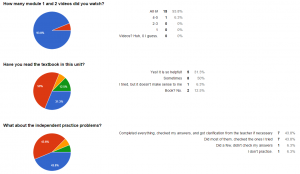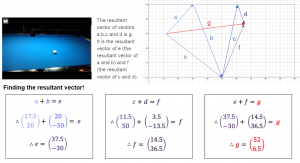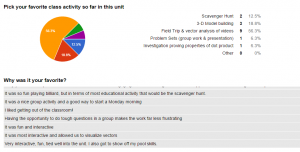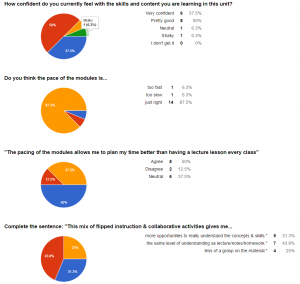I’ve written two posts already about this year’s action plan: Balancing Inquiry and Content in Mathematics. Specifically, my colleagues and I have worked collaboratively on a revamp of our grade 12 Vectors unit. The results are in… are you ready??
…… DRUM ROLL PLEASE ….
IT WAS A SUCCESS!
Here, some reflection on specifics:
I did a mid-unit feedback survey to gather information on student work habits, their opinions on the current unit, and their comfort level with the material. That provided some necessary input for me halfway through, and I adapted the remaining lessons accordingly. For instance, I found that my students were mostly doing the work of information-gathering and independent practice:
I kept the survey anonymous, and asked them to be “honest and kind” in their responses. The student who claims to not practice? He really didn’t practice. But then, he didn’t need to because he understood it all without the busywork. I’m ok with that!
Then I asked for some opinions on the class activities. As class time was freed from the work above, we used the time for large and small group collaborative learning. Some was kinesthetic, some was theoretical, and all of it was meant to get them thinking differently about the concepts, communicating, moving, and analyzing. They loved the pool hall and the slides we created with their shots, like this:
Here is their feedback on the activities, both good and bad:
We knew we wouldn’t get it perfect on this first run, and our scavenger hunt was well planned but we missed some opportunities to set it up for a more successful run. In our next iteration, we already know how we want to modify to better communicate the task. The students were good sports about it.
Finally, I asked about their perceived comfort level with the material and their opinion on the methods with flipped learning:
This part of the survey helped me focus our last 3 lessons. I let them work individually, so they could consolidate their own understanding. I designed and led a structured conceptual recap of our 3rd module, making sure that the students had successfully made the jump to further abstraction in the topic. One student told me hesitantly on our final review day that she hadn’t enjoyed the unit at all, and that she found it much better when I lectured and gave her both the outline of the notes and showed her what to write down. We’ll come back to that student in just a minute.
So then we gave the students a test – straight from the types of questions they will see on their IB Diploma exams, and I waited and watched as they worked for 60 minutes solving those problems.
This test had an average result of 83.6%, as opposed to the others this year which were all in the mid 70’s. WOW.
Even better: All of the students performed at or above their own personal averages! In fact, my two students with the lowest cumulative averages performed so well, I had to pull them aside and congratulate them early! One of these students is the very same student I mentioned above, who hesitantly lodged her complaints about the learning methods in this unit. I reflected with her after I gave back the test results: perhaps she was uncomfortable, but she was obviously learning.
This unit was a lot of work to plan, but it was actually less prep work to run each lesson, compared to a standard chalk-n-talk unit. Our collaborative strategy meant that we each focused on what we did best, which made the work easier for all of us. What is still missing is the collaborative reflection step, where we can not only share what we think of the unit, but of our teamwork.
Was this a perfect balance of inquiry and content? I can’t really say, as we don’t have a baseline to compare to. This is actually the first time we’ve moved the unit to grade 12. Perhaps they were more ready for the content, or perhaps the test was easier than usual. You can be sure I will compare next year’s results to this year’s, to try and keep tweaking to find the optimum set of activities and instruction.
My colleagues and I have said we’d like to adapt this process to other units we teach, and are hopeful that we can manage 1 unit per course per year. That would set us up for an ideal rotation of curriculum review and allow us to revisit every concept we teach over the next few years… wish us luck!






What an excellent post and a fantastic action plan! You put forward a new way of learning for your students within the framework of IB – it’s incredibly inspiring!
I love your openness not only to ask your students for feedback but to share that honest feedback with all of your readers takes courage and strong belief that what you’re doing is, as you have proven, the right way to do it.
I really liked your focus on being uncomfortable but still learning. I think Ss sometimes shut down when they are uncomfortable without giving it much of a chance. I’ve ofter heard those comments about things not being organized or we didn’t learn anything yet when it comes time to express themselves and present their ideas.
I think as we allow Ss to have more control of their learning, they get more comfortable but it’s still not the norm in many schools. It’s great to have such incredible examples – especially within the rigid framework of IB! It proves that this can be done at all levels and in all schools. We just need to collaborate and share, and we’ll change the world!
I love this! I am not at all in the “world of math” but reading this got ME excited about it! And I am sure that all of the opportunities you gave students for feedback allowed them to feel a greater degree of ownership over their learning and knowledge. Well done!
I HAVE to echo Derek’s comments! Really reaching into a student’s point-of-view and having them reflect on their comfort level sets up such a powerful life lesson: sometimes learning is messy, sometimes it can be downright uncomfortable. Just like growing, just like trying new things. But that doesn’t mean we should avoid them (or that we can benefit from being pushed out of our comfort level!)
Thank you for your thoughtful and methodical investigation into your collaborative experience this year. I’d love to know how Classkick might help students push their boundaries in the future! Any specific assignments or open-ended learning activities we can collaborate on?